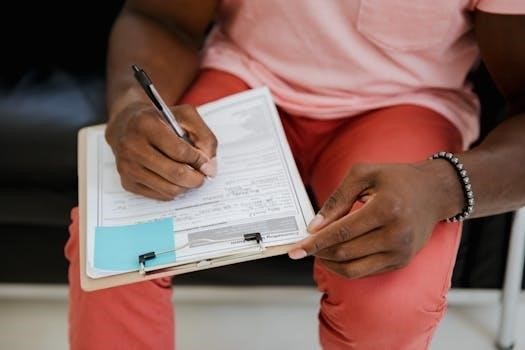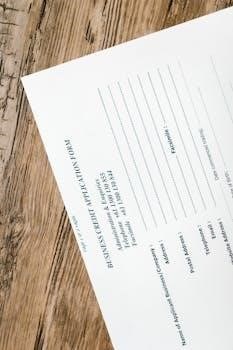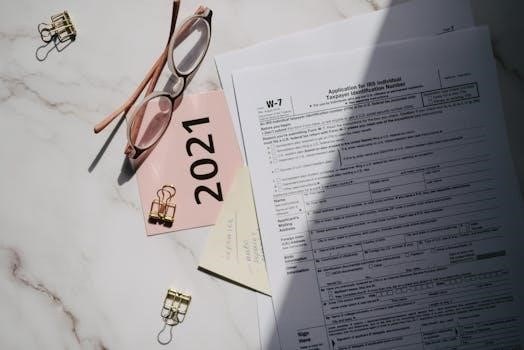uganda national id application form pdf
The National Identification and Registration Authority (NIRA) is the body responsible for issuing National IDs to Ugandan citizens and legal residents. NIRA manages the National Identification Register and utilizes biometric data for identification purposes. The process begins with obtaining the application form, available in PDF format.
Overview of the National Identification and Registration Authority (NIRA)
The National Identification and Registration Authority (NIRA) is a government organization in Uganda responsible for creating and maintaining the National Identification Register. NIRA’s mandate includes registering all citizens, legally residing non-citizens, births, and deaths. It uses biometric techniques for secure identification and data management. Established under the Registration of Persons Act, 2015, NIRA aims for a unified approach to citizen registration and identification. NIRA issues the National Identification Card as a bio-metrically enhanced, machine-readable document.

Purpose and Importance of the National ID
The National ID is essential for all Ugandan citizens and legal residents, serving as proof of identity. It is crucial for accessing various services and participating in national processes. It also helps in the socio-economic development of the country.
Legal Mandate of the National ID System in Uganda
The National ID system in Uganda is legally mandated by the Registration of Persons Act, 2015. This act formalized the establishment of NIRA and the National Identification Register. It outlines NIRA’s responsibilities in creating, managing, and maintaining the register. The act also stipulates the legal obligations for citizens and residents to register and obtain a National ID, which serves as an official form of identification.
Significance for Ugandan Citizens and Legal Residents
The National ID is a crucial document for Ugandan citizens and legal residents. It serves as proof of identity for accessing various services, including banking, healthcare, and education. The National ID is also essential for participating in national processes like voting. Possessing this ID ensures that individuals are properly recognized within national systems, facilitating social and economic development and enhancing security.

Application Process for the National ID
To apply for a National ID, one must first download the application form, often available as a PDF from the NIRA website. Then gather the required documents needed for registration, as specified by NIRA.
How to Obtain the Application Form (PDF)
The Uganda National ID application form is primarily available as a PDF document. The most reliable way to obtain this form is through the official website of the National Identification and Registration Authority (NIRA). It is advised to download the form directly from the NIRA website to ensure you have the most current version and to avoid potential issues with unofficial sources, keeping in mind that the form is free.
Required Documents for Registration
To successfully register for a National ID in Uganda, several documents are required. These typically include a birth certificate or baptism certificate, an immunization card, or a voter’s identification card. Other acceptable documents are immigration documents, a valid Ugandan or foreign passport, a valid driving license, a valid residence permit, or a certificate of acquired citizenship. It’s crucial to present original documents along with photocopies during the registration process.

Key Sections of the Application Form
The application form requires detailed personal information, including the applicant’s place of origin in Uganda, their parents’ names, and, if applicable, their spouse’s details. Accuracy in this section is vital for correct registration.
Personal Information Details
The personal information section of the application form requires the applicant’s full name, date of birth, and gender. It also mandates the inclusion of the applicant’s occupation and current living status. Additionally, details about the applicant’s citizenship type must be provided. This information is crucial for establishing a unique identity within the National Identification Register and must be filled out completely and accurately to avoid any processing delays.
Family and Origin Details Required on the Form
Applicants must provide their place of origin in Uganda, including district, county, sub-county, parish/ward, and village. Information about the applicant’s parents is essential, including their names, and whether they are alive or deceased. If applicable, the applicant must provide the spouse’s details including names, National ID number, place and date of marriage, and type of marriage. This ensures accurate records of family linkages within the national register.

Submitting the Application
The application process requires in-person registration at designated centers. Applicants must submit their completed forms and required documents. Online application is currently unavailable, and personal collection of the ID is mandatory.
In-Person Registration and Collection Process
The Uganda National ID application process mandates in-person registration at designated NIRA offices or registration centers. Applicants must physically present their completed application forms along with all the necessary supporting documents. Biometric data, including fingerprints and facial recognition, is captured during this registration. After processing, the National ID card must be collected in person at the designated collection center; it cannot be mailed or collected by proxy.
Clarification on Online Registration Availability
While NIRA has implemented an online portal for some functions, the initial application for the Uganda National ID cannot be completed entirely online. The application process requires physical presence for biometric data capture, which is a crucial step in the registration procedure. Although some online resources, like forms, are available for download, complete online registration is not currently an option, and applicants are required to visit a registration center.
Post-Application Information
After submitting the application, processing time for the National ID varies. Applicants will receive a notification for card collection. It’s essential to address any errors promptly to avoid delays.
Processing Time and Card Collection
The processing time for a Uganda National ID varies, depending on the application location. Applications made at NIRA district offices may have different timelines than those processed through embassies. Once processed, applicants receive notification of where to collect their cards. The embassy posts a list of printed identification card names on their website for easy access, and this may take up to three months. Individuals must pick up their cards in person.
Notification of Changes or Errors
If there are changes or errors in your National ID information, you must notify NIRA. A specific form is available for this purpose, and it requires all marked fields to be completed. After submitting the form, you will receive a notification number and be informed of the date and location to pick up your corrected ID. This process ensures the accuracy of the national register and individual identification.
NIRA’s Role and Responsibilities
NIRA’s mandate includes creating and managing the National Identification Register. They register citizens, legal residents, births, and deaths. NIRA also uses biometric techniques to ensure secure identification processes.
Creation and Management of the National Identification Register
NIRA is tasked with the crucial responsibility of establishing and maintaining a comprehensive National Identification Register. This register is a centralized database containing the details of all Ugandan citizens and legally resident non-citizens. The process involves meticulous data collection, verification, and storage using advanced biometric technologies. This system ensures the accuracy and integrity of national identification records, which is vital for security and governance purposes.
Data Security and Biometric Techniques
NIRA employs robust data security measures to protect sensitive personal information within the National Identification Register. The system uses biometric techniques, such as fingerprint and facial recognition, to verify the identity of cardholders and prevent fraud. These technologies add an extra layer of security, ensuring that the data is both accurate and protected. The security of this data is paramount for maintaining public trust and the integrity of the national identification system.
Mass Enrollment and Renewal Initiatives
Mass enrollment programs have been conducted to register citizens, with a focus on reaching all eligible Ugandans. Renewal initiatives are also in place for expired IDs, ensuring the register remains current. These efforts aim to ensure all are registered.
Overview of Mass Registration Programs
Uganda has undertaken mass registration programs to facilitate the enrollment of its citizens into the National Identification Register. These initiatives aim to ensure that all eligible individuals, both within Uganda and those living abroad, have access to the national identification system. These large-scale efforts are crucial for achieving comprehensive coverage and are often conducted at various locations across the country. The programs are vital for national planning and development.
Information on Renewal Processes
The renewal process for the Uganda National ID is essential to maintain the accuracy and validity of the National Identification Register. Citizens are required to renew their IDs when they expire or when there are changes in their personal information. The application form for renewal can be obtained, and the process involves updating personal details and submitting necessary documents. NIRA provides guidelines on how to complete the renewal application, including locations for submission.
Additional Information
To verify registration status, NIRA provides methods for checking. Contacting NIRA directly is essential for support and clarification. They are available to address queries and provide assistance regarding registration processes.
Verification of Registration Status
NIRA provides methods to verify your registration status after submitting the application. A notification number is often given during registration, which can be used to check the progress. In addition, there are other channels to confirm the status through NIRA. These methods help applicants stay informed about the processing of their National ID application. This ensures transparency and allows individuals to track their application status efficiently.
Contacting NIRA for Support
For any inquiries or assistance regarding the National ID application process, NIRA offers several contact options. You can reach out to their offices directly for support. Additionally, the NIRA website provides contact details and FAQs to address common queries. This support ensures applicants can resolve issues and navigate the registration process effectively. NIRA also offers assistance with notification of changes or errors in the provided information.
Common Issues and Solutions
Applicants may face challenges such as processing delays or errors in their information. NIRA provides procedures for addressing these issues, including notification of changes or errors. Understanding these solutions is key to a smooth experience.
Addressing Delays in Processing
Delays in processing National ID applications can occur due to various factors. Applicants should first verify their registration status using their notification number provided during the application process. If significant delays are experienced, contacting NIRA directly is recommended. The NIRA website offers contact details and support channels to address processing delays. Understanding that processing times can vary depending on the application location is also important for managing expectations.
Resolving Errors in Information
If errors are identified on a National ID, a notification of change or error form must be completed. This form, available from NIRA, is essential for correcting inaccurate information. A deed poll, obtained through a lawyer and approved by the Uganda Registration Services Bureau, may be required to support corrections. Applicants should also provide copies of supporting identification documents to validate the changes. The corrected ID will then be issued following verification.







Leave a Comment